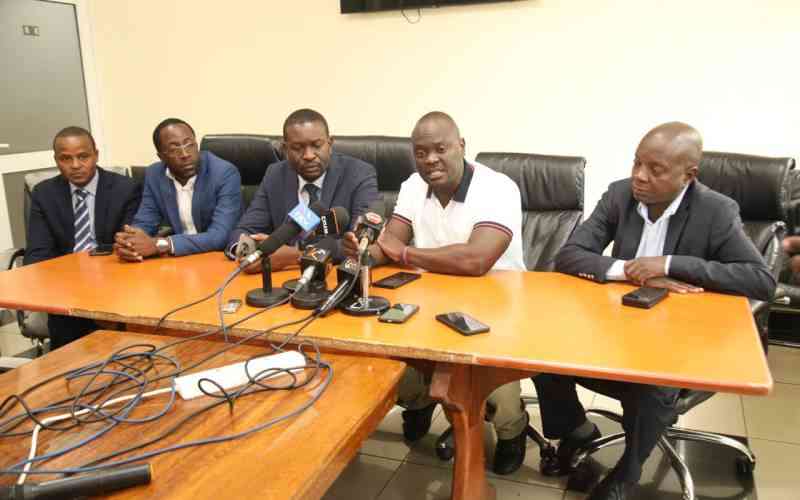Ghost Hospitals & Billions: Inside Kenya's Explosive SHA Fraud Saga
)
The Social Health Authority (SHA), established to replace the graft-ridden National Health Insurance Fund (NHIF) and restore public confidence in Kenya's health system, is now at the center of a significant fraud scandal. This situation has led to heightened scrutiny of the Ministry of Health, with allegations surfacing that "ghost hospitals" have received payouts and politically connected entities have been favored in claim disbursements, according to accusations from the Rural and Urban Private Hospitals Association of Kenya (RUPHA) chairperson, Brian Lishenga.
Health Cabinet Secretary Aden Duale, addressing the widespread allegations of corruption and non-compliance, announced that the SHA has rejected over Sh10.6 billion in claims due to suspected fraud and non-compliance since the TaifaCare program was rolled out on October 1, 2024. During a press conference at Afya House, CS Duale reaffirmed the government's "uncompromising stance against fraud," emphasizing that public funds must exclusively serve legitimate, life-saving healthcare needs.
The Ministry's intensified anti-fraud campaign has led to substantial enforcement actions. Since the TaifaCare rollout, health facilities submitted claims totaling Sh82.7 billion, of which Sh53 billion has been paid out. However, a rigorous digital audit system flagged numerous irregularities, resulting in the closure of 728 non-compliant facilities, the suspension of an initial 40 hospitals, and the ongoing degazetting of another 45 facilities pending further investigation.
The audits revealed a litany of troubling fraudulent practices. These included phantom billing, where claims were submitted for services rendered to non-existent patients; upcoding, involving billing for more expensive procedures than those actually performed; falsification of medical records; and illegal inpatient conversions, where simple outpatient visits were billed as inpatient admissions. Specific examples of alleged fraud cited by the Ministry include Nabuala Hospital in Bungoma, accused of falsifying claims for multiple Caesarean sections on the same patient within days, and Kotiende Medical Centre in Homa Bay, flagged for a single person purportedly signing off on both day and night shifts for consecutive days. Furthermore, a group of facilities in Mandera allegedly colluded to submit 312 fraudulent claims for patients admitted simultaneously across multiple locations.
In response to the growing uproar, former Chief Justice David Maraga publicly called on the Ethics and Anti-Corruption Commission (EACC) to launch a thorough investigation into the SHA payments fiasco, advocating for the recovery of all lost funds and the prosecution of those found responsible. Maraga also demanded full transparency from the Ministry of Health and SHA, requesting disclosure of collected funds, parliamentary allocations for the Primary Health Care and Emergency Fund, and a detailed list of all hospitals and service providers that have received payments.
Both former CJ Maraga and Dr. Brian Lishenga criticized the Ministry's decision to disable the Kenya Master Facility Registry (KMFR) and pull down a list detailing claim payments from the SHA website. They argued that these actions breach Kenyans' constitutional right to access information and demonstrate a lack of control over its own data by the Ministry. The KMFR contains critical data on all health facilities, including their geographical location, bed capacities, and regulatory bodies, making its unavailability a significant concern for public verification.
The scandal has also brought to light the deplorable conditions of some facilities classified under the scheme. Reports indicated that some Level 4 facilities lacked even a single inpatient bed, while others operated from single rooms resembling kiosks, raising questions about the legitimacy of their operations and classifications. Health stakeholders and leaders across the country have collectively called for CS Aden Duale to take personal responsibility for the widespread fraud.
CS Duale reiterated that the fight against corruption is a core pillar of the new TaifaCare program, which is rooted in the constitutional right of every Kenyan to access high-quality health. He urged citizens to report any suspicious activities through the toll-free number 147. Looking forward, the Ministry assured that all verified legacy debts from the defunct NHIF, amounting to Sh0-10 million, would be paid. Additionally, a "Joint Anti-Fraud Action" initiative is being formed in collaboration with leading medical insurance companies to strengthen efforts in combating malpractice across the entire sector. CS Duale concluded by stating the Ministry's unwavering commitment to ensuring every Kenyan has access to quality, affordable, and dignified healthcare, free from fraud.
You may also like...
Blockbuster Showdown: Jake Paul vs. Gervonta Davis Set for November 14!

Boxing sensations Jake Paul and Gervonta "Tank" Davis are set to clash on November 14 in an unexpected exhibition bout s...
WNBA Playoff Fever: Aces Clinch, Teams Scramble for Postseason Berths!

The 2025 WNBA playoffs kick off September 14, introducing a best-of-seven Finals series for the first time. The Minnesot...
Netflix Sensation: ‘KPop Demon Hunters’ Shatters Records, Eyes Oscar Glory

Netflix's "KPop Demon Hunters" has become the most-streamed movie in the platform's history and is now a significant Osc...
The Hunt for 007: New Writer, Actors Weigh In on Next Bond Era

The search for the next James Bond continues post-Daniel Craig, with 'Peaky Blinders' creator Steven Knight confirmed as...
Naira Marley Breaks Silence on Mohbad's Death, Denies Involvement in Viral Documentary

Nigerian musician Naira Marley has finally shared his detailed account regarding the death of his former signee Mohbad, ...
Reading & Leeds Rocked By Secret Set Rumors: Fans Uncover Hidden Gems

The Reading and Leeds Festivals are buzzing with speculation as fans anticipate secret sets from major acts like Foo Fig...
Bianca Censori's Shocking Public Persona: Nude Displays & Kanye's Power of Attorney!

Bianca Censori continues to make headlines with her controversial and revealing fashion choices, frequently appearing in...
Oasis Reunion Roars Back: Legal Battle Looms as Andy Bell Confirms Line-Up!

The highly anticipated Oasis reunion tour is set to kick off in 2025 with bassist Andy Bell confirming his involvement, ...
